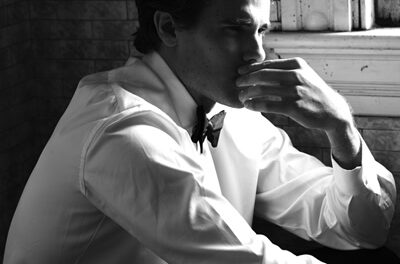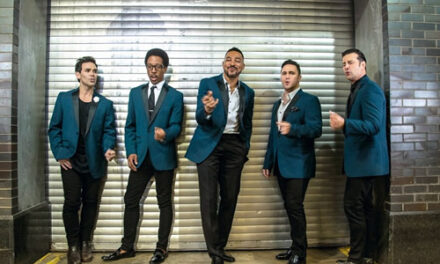Any non-profit endeavor that manages to hang on for a decade, particularly in this current, chilly funding climate, deserves a vigorous nod of admiration. When that group is a performing arts organization, hats should be thrown liberally into the air. To go even further: when the performance entity in question is gay, great should be the tumult thereof, as Peter Cook once observed in a different context.
So it is with the Triangle Gay Men’s Chorus (TGMC), which commemorated its first decade with “10” — Celebrating Our Tenth Anniversary, a June 18 concert at Durham’s Carolina Theatre. I hope I’ve conveyed the proper level of respect and appreciation because in the next breath I have to report that the evening was a decidedly mixed bag. Or perhaps the cliché in question should be “half a loaf,” since the merits of the second half neatly balanced the deficits of the first.
It was in Part One (“Men”), which consisted largely of solos, that the conundrum was at its most pronounced, as singer after singer evinced three identical deficiencies. First, volume: much of the solo vocalizing was scarcely audible. Second, range: many songs were assigned to men who had difficulty pushing out the low notes yet couldn’t quite manage the high ones with assurance either. And third, pitch: with three rather notable exceptions, every soloist displayed a dismaying tendency to wobble or wander. (The concert’s first half also felt somewhat under-rehearsed.) What made this situation so confounding was that, when singing together, in full chorus, these very same vocalists meshed beautifully and with almost unerring force and effect. It was a most impenetrable, if not ingenious, paradox.
The top vocal honors in Part One went to Chris Newlin, who performed Avenue Q‘s “If You Were Gay” with bold comic brio, and Rick Elliott, whose big, vibrato-laced baritone made “The Man I Love” the evening’s musical high point, marred only by a less-than-salutary choral accompaniment. TeKay (Thomas King) graced the Jekyll and Hyde “Bring on the Men” opening number with his glorious lyric-tenor-bordering-on-soprano, although even he was a bit stretched by the range, occasionally passing into a slightly uncertain falsetto.
The finest song in the concert was an exquisite setting by David Maddux of Amistead Maupin’s “Michael’s Letter to Mama” — although the performance didn’t match the splendid, proud, yearning quality of the music and prose. The greatest voice belonged to TGMC President Brandon M. Bowman, who capped his moving anniversary speech with an assured, powerful, and effortless rendition of Ragtime‘s gripping peroration “Make Them Hear You” — a song that never fails to make me cry — that caused me to shake my head in astonishment through those tears and to wonder where the hell he’d been all night.
The Chorus roused itself to its own glory in Part Two (“10 Years.”) Under Berry Gentry’s often-superb direction, this collation of past glories ranged from “The Battle Hymn of the Republic” to “Where the Boys Are,” taking in the deliciously barbed satirical ode “Color Out of Colorado” and a strutting “One,” complete with a be-hatted chorus line in varying stages of terpsichorean proficiency. While a sour note skewed the coda of “Over the Rainbow,” and an otherwise pure, yearning tenor went off-pitch at the climax of “God Help the Outcasts,” nothing but nothing marred the Chorus’s superb performance of the Gretchen Cryer-Nancy Ford “Old Friends,” another song guaranteed to reduce this listener to tears.
Accompaniments were provided by pianist Timothy Owens, bassist Robbie Link, and drummer Andrew Munger.
One last puzzler. In his program notes, guest conductor Gentry rightly castigated our media for its propensity to “[portray] the gay community only in its extreme stereotypes.” Yet the concert itself opened with one: the Leatherman, with all his accoutrements. Well, which is it?
*We welcome theatre critic Scott Ross to the music side of the CVNC house with this review.












